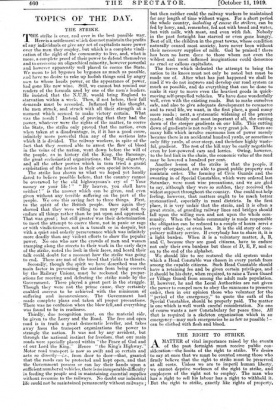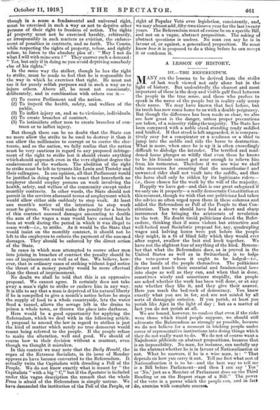THE RIGHT TO STRIKE.
AMATTER of vital importance raised by the events of the past fortnight must receive public con- sideration—the limits of the right to strike. We desire to say at once that we must be counted among those who firmly believe that the right to strike must be preserved at all costs. Unless we are to imperil human liberty, we cannot deprive workmen of the right to strike, and employers of the right not to employ. The man who has a right to sell his labour has a right to withhold it. But the right to strike, exactly like rights of property, though in a sense a fundamental and universal right, must be exercised in such a way as not to deprive other persons of their right to freedom of action. The rights of property must not be exercised harshly, arbitrarily, or irresponsibly in such matters as eviction, the enforce- ment of penalties in contracts, and so forth. The Courts, while respecting the rights of property, refuse, and rightly refuse, to listen to the absolute plea of : " May I not do what I will with mine own ? " They answer such a demand : " Yes, but only if in doing so you avoid depriving somebody else of his rights." In the same way the striker, though he has the right to strike, must be made to feel that he is responsible for the way in which he exercises that right. He must not use it for purely selfish purposes and in such a way as to injure others. Above all, he must not consciously, deliberately, and in combination with others use it— (1) To coerce Parliament and the nation.
(2) To imperil the health, safety, and welfare of the public.
(3) To inflict injury on, and so to victimize, individuals. (4) To create breaches of contract.
(5) To intimidate other men to create breaches of con- tract or to inflict injury.
But though there can be no doubt that the State can no more allow the strike to be used to destroy it than it can allow the millionaire to corrupt or to coerce the elec- torate, and so the nation, we fully realize that the nation must be very cautious in regard to any proposed infringe- ment of the right to strike lest it should create anything which should approach even in the very slightest degree the enslavement of the workers. The abolition of the right to strike must be left to tyrants like Lenin and Trotsky and their colleagues. In our opinion, all that Parliament would be justified in doing would be to enact that henceforth no employer should employ persons on work involving the health, safety, and welfare of the community except under monthly contracts. In other words, the State should not permit in the services aforesaid terms of employment which would allow either side suddenly to stop work. At least one month's notice of the intention to stop work must be given. We would make the penalty for a breach of this contract assessed damages amounting to double the sum of the wages a man would have earned had he been at work during the period in which it was illegal to cease work—i.e., to strike. As it would be the State that would insist on the monthly contract, it should not be left to the employers to enforce the payment of the assessed damages. They should be enforced by the direct action of the State.
In cases in which men attempted to coerce other men into joining in breaches of contract the penalty should be one of imprisonment as well as of fine. We believe, how- ever, that in ordinary cases of striking without legal notice the threat of a money penalty would be more effectual than the threat of imprisonment.
No doubt we shall be told that this is an oppressive proposal. We cannot agree. It certainly does not take away a man's right to strike or enslave him in any way.
It is idle to say that a man is deprived of his natural liberty if he is compelled to give a month's notice before he stops the supply of food to a whole countryside, lets the water flood a tunnel, allows the sewage left in the drains to poison a whole town, or throws the place into darkness.
Here would be a good opportunity for applying the Referendum, which we deal with in the following article. A proposal to amend the law in regard to strikes is just the kind of matter which surely no true democrat would resent being referred to the people. If the people refuse to make the alteration, well and good. We should of course bow to their decision without a murmur, even though we thought it mistaken. In this context we may note that the Daily Herald, the organ of the Extreme Socialists, in its issue of Monday appears to have become converted to the Referendum. It actually twits the Capitalists with dreading a Poll of the People. We do not know exactly what is meant by " the Capitalists " with a big " C," but if the Spectator is included under this vague description the remark that the whole Press is afraid of the Referendum is simply untrue. We have demanded the institution of the Poll of the People, or right of Popular Veto over legislation, consistently, and, we may almost add, fifty-two times a year for the last twenty years. The Referendum must of course be on a specific Bill, and not on a vague, abstract proposition. The asking of abstract questions is useless. No man can say he is in favour of, or against, a generalized proposition. He must know how it is proposed to do a thing before he can accept it or condemn it.



































 Previous page
Previous page